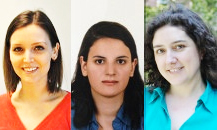2015 MIT Rising Stars Workshop Features Three Columbia Engineers
This story was originally published by the Department of Electrical Engineering.

Two current electrical engineering doctoral candidates and one postdoc—Jelena Marašević, Rabia Tugce Yazicigil, and Dessislava Nikolova—have been selected among the top 60 female graduate students and postdoctoral scholars invited to participate in the 2015 MIT Rising Stars in Electrical Engineering and Computer Science Workshop, an annual program that unites the top women in EECS for two days of research presentations and informal panels and is aimed at those navigating the initial stages of their academic career.
Jelena Marašević is a PhD student at Columbia University in the Wireless and Mobile Networking Lab advised by Professor Gil Zussman. Her research focuses on algorithms for fair resource allocation problems, with applications in wireless networks. She received her BSc degree from the University of Belgrade School of Electrical Engineering in 2011, and her MS degree in electrical engineering from Columbia University in 2012. For her MS degree, she received the MS Award of Excellence.
In Spring 2012, Jelena organized the first cellular networking hands-on lab for a graduate class in wireless and mobile networking. For this work, she received the Best Educational Paper Award at GENI GREE2013, and she was also awarded the Jacob Millman Prize for Excellence in Teaching Assistance from Columbia University. In 2015, Jelena and Columbia EE PhD student Jin Zhou won a Qualcomm Innovation Fellowship Award for a joint interdisciplinary research proposal on full-duplex communication in OFDM networks.
Rabia Tugce Yazicigil is a PhD student in the Columbia Integrated Systems Lab advised by Professors Peter Kinget and John Wright. Her interdisciplinary research work focuses on developing and implementing novel spectrum sensing architectures exploiting compressed sampling for future cognitive radio systems. This past February, she collaborated and presented her research on "A 2.7-3.7GHz Rapid Interferer Detector Exploiting Compressed Sampling with a Quadrature Analog-to- Information Converter" together with a live demo of the system at the prestigious 2015 IEEE International Solid-State Circuits Conference (ISSCC), which was supported by the National Science Foundation EARS program in collaboration with Interdigital Communications.
Rabia has previously won second place at the Bell Labs Future X Days Student Research Competition with her research on “Enabling Cognitive Radio Systems with Compressed-Sampling Rapid Spectrum Sensors”. She has also received the Analog Devices Inc. Outstanding Student Designer Award to attend ISSCC 2015 as an acknowledgment of her research and academic achievements, as well as the 2014 Millman Teaching Assistant Award of the Electrical Engineering Department at Columbia University for the Spring 2014 semester.
Dessislava Nikolova is a member of Professor Keren Bergman’s Lightwave Research Lab. Dessislava’s research focuses on the design, modeling, and demonstration of optical systems for communications and networking using nanophotonic devices. Part of her research is devoted on large-scale system design with the goal to develop scalable, flexible, and resilient network components such as spatial and wavelength switches. Another part is focused on the design of optical interconnects with silicon photonic devices aimed at providing high-speed, energy-efficient data movement or long-distance quantum key distribution for secure communications. The systems designs make use of the device models she develops using fundamental electromagnetic theory. She also performs cleverly designed experiments using existing devices allowing her to validate and demonstrate the feasibility of the novel optical systems. She received her PhD from Antwerp University in the area of optical networks. Her work was recognized with the Best Paper award at the SPECTS symposium and led to a patent. Subsequently she went to the London Centre for Nanotechnology to do research in plasmonics on a project for which she was awarded a Marie Curie fellowship. Her two backgrounds—networking and nanoscale photonics—are combined in her current research pursuits at Columbia University in silicon photonic devices for optical interconnects, networks and quantum communications.
